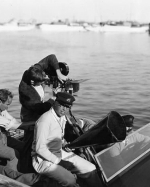King Vidor
King Wallis Vidor was an American film director, film producer, and screenwriter whose career spanned nearly seven decades. In 1979 he was awarded an Honorary Academy Award for his “incomparable achievements as a cinematic creator and innovator.” He was nominated five times for a Best Director Oscar, and won eight international film awards during his career.
He was born in Galveston, Texas, where he survived the great Galveston Hurricane of 1900. His grandfather, Charles Vidor, was a refugee of the Hungarian Revolution of 1848 who settled in Galveston in the early 1850s.
A freelance newsreel cameraman and cinema projectionist, Vidor made his debut as a director in 1913 with Hurricane in Galveston. In Hollywood from 1915, he worked on a variety of film-related jobs before directing a feature film, The Turn in the Road, in 1919. A successful mounting of Peg o’ My Heart in 1922 got him a long term contract with Goldwyn Studios, later to be absorbed into MGM. Three years later he made The Big Parade, among the most acclaimed war films of the silent era, and a tremendous commercial success. This success established him as one of MGM’s top studio directors for the next decade. In 1928, Vidor received his first Oscar nomination, for The Crowd, widely regarded as his masterpiece and one of the greatest American silent films. In the same year, he made the classic Show People, the last silent film of Marion Davies, a comedy about the film industry in which Vidor had a cameo as himself and his much-loved screwball comedy The Patsy.
Vidor’s first sound film was Hallelujah!, a groundbreaking film featuring an African-American cast, and in which he established the new language for sound films. His directorial career extended well in to the sound era and he continued making feature films until the late 1950s. Some of his better known sound films include Stella Dallas, Our Daily Bread, The Citadel, Duel in the Sun, The Fountainhead, and War and Peace. He directed the Kansas sequences in The Wizard of Oz when director Victor Fleming had to replace George Cukor on Gone with the Wind, but never received screen credit.


